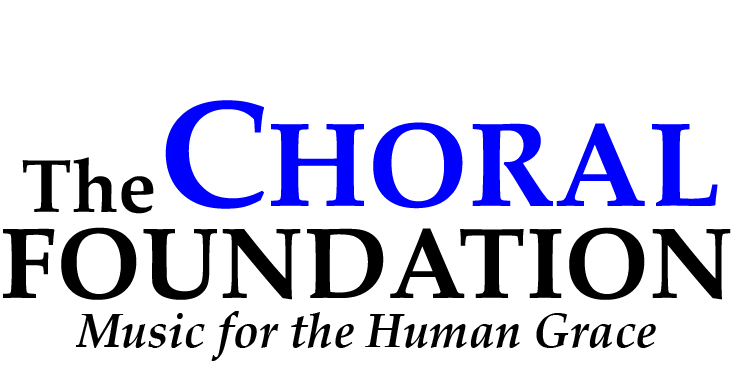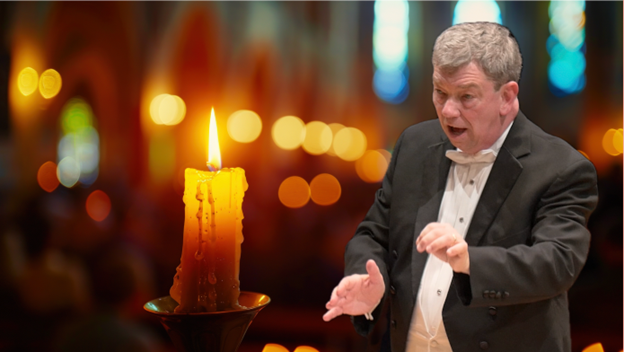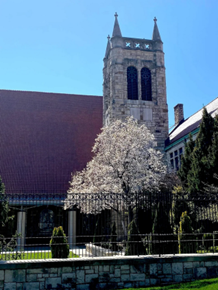The William Baker Festival Singers Present
Candlelight, Carols and Cathedral
By Patrick Neas, KC Arts Beat | December 8, 2025
The medieval mystic St. Bernard of Clairvaux once wrote, “Cathedrals are sermons in stone, and their music is the voice of heaven itself.”
Every year, the William Baker Festival Singers bring the stones of Kansas City’s cathedrals to life with Candlelight, Carols, and Cathedral. As always, this year’s enchanting concert of beloved hymns and carols will take place in Grace and Holy Trinity Cathedral at 2 p.m. December 14 and the Cathedral of the Immaculate Conception at 7:30 p.m. December 19. Baker’s choir of 45 singers will be joined by organist John Schaefer and a percussion ensemble.
“We say that Candlelight Carols and Cathedral celebrates the beauty and wonder of Christmas,” William Baker said.
This is the 28th year the Festival Singers has presented the annual concert. Baker says that it’s “an alternative-to-alternative Christmas celebrations.”
“In the music world, we're always looking for something different, some shiny new object, some innovation, a different twist on tradition,” Baker said. “But Christmas is one of those anchor seasonal celebrations that holds the heart, and I think there is a place for candles and processions and for singing the carols with the words that we grew up with, in elegance and beauty and tradition.”
Baker says that Candlelight, Carols and Cathedral is inspired by the Anglican tradition of the Festival of Lessons and Carols.
“It begins with an organ voluntary, followed by an introduction and procession, then there are carols and readings from scripture in traditional King James language, and those readings are punctuated by choral works,” Baker said. “Some of the choral works are new, especially this year as we're celebrating the music of our own composer-in-residence, Sean Sweeden, but many of them, and certainly the carols, are going to be very, very traditional. Things that we have loved since childhood.”
Grace & Holy Trinity Cathedral
Kansas City, Missouri
Cathedral of the Immaculate Conception
Kansas City, Missouri
After organist John Schaefer opens the concert with an attention-grabbing organ work, the choir will intone Veni, Veni Emmanuel (“O Come, O Come Emmanuel”) at the back of the church. This haunting Advent hymn traces its roots to the eighth or ninth centuries, when monasteries would mark the seven days before Christmas eve by chanting a different “O” antiphon each night. For example, “O Emmanuel,” “O Adonai,” “O Key 0f David,” etc. The Festival Singers will sing a modern arrangement of this ancient hymn by the outstanding young composer Ed Frazier Davis.
O Key of David, Maître du Méliacin Antiphonaire dominicain. 1300
Then the choir will process to the front of the church to O Come, All Ye Faithful. Following that is the first selection by composer-in-residence Sean Sweeden, Everywhere I Go.
“A great composer is one whose music is planted in different soils,” Baker said. “There are some composers whose names I won't mention, but you hear their music and, okay, they've written a wonderful piece of music, and then they write it 20 times more in different clothing. Sean's music has an incredible diversity of sound. Everywhere I Go is a setting of a spiritual for men's chorus. It’s rambunctious, and it's out there, and after the procession, it announces the joy of the concert.
Other works by Sweeden on the concert include Adam Lay Ybounden, There is No Rose, In the Beginning and Alleluia.
“Sean is a percussionist, and his music is highly rhythmic,” Baker said. “Several of his pieces will use one or another of his percussion instruments, and that is certainly the case with the Alleluia on the program. I never quite know which percussion goodies he's going to bring, but it's always a delight when he does.”
Ed Frazier Davis
Dr. Sean Sweeden
Two notable works on the program are from the Russian Orthodox tradition, two settings of O Gladsome Light, one from Sergei Rachmaninoff’s Vespers and the other by Alexander Grechaninov. The Rachmaninoff will be sung in Church Slavonic and the Grechaninov in English.
“We did the Rachmaninoff last year on our tour to the Southeast in Atlanta, and the group sang it very nicely,” Baker said. “It has such a rich texture, and the Festival Singers, for a semi-professional ensemble, is a larger ensemble than most, so we're able to do this late Romantic music with depth. I told the choir I think this piece was written for them. We're quite blessed that one of our members is the former accompanist of the Yale Glee Club, and he's one of our staff pianists, as well. But his work now is as an editor for Oxford University Press, and he is quite gifted in languages, so he has been our coach for the Church Slavonic.”
The wide-ranging musical selections will include a work by the contemporary composer René Clausen, Seek the Lord, and a work by the 19th century Austrian composer Anton Bruckner, Virga Jesse, which will be conducted by Christine Freeman, associate director of music for the Festival Singers.
“Christine began with us as a student intern,” Baker said. “Our student intern program has graduated 40 young conductors that are all over the country, leading in university and school and church and professional choral worlds, and Christine is one of them. Virga Jesse is another one of those pieces that’s got Festival Singers written all over it because of its richness. It was on our November concerts, and Christine did such an amazing job with it that I said, you've got to do that on Candlelight Carols and Cathedral.”
Sergei Rachmaninoff
Alexander Grechaninov
Anton Bruckner
Christine Freeman, MME
When you attend a Festival Singers performance, you can tell that it’s not mere entertainment. There is a fervor that is palpable. Baker doesn’t make a show of it, but in private conversations, he often speaks of his personal faith and how it informs his music. Although the Festival Singers is not a religious choral ensemble, per se, there is no doubt that Baker’s faith brings out something special in his singers.
“I make no secret that the story of Christmas, the story of God's reaching into our lives to bring us hope and salvation, I believe with all of my heart,” Baker said. “Candlelight Carols and Cathedral is an unapologetic celebration of the story of the omnipresent God coming in the guise of a vulnerable infant to bring hope and help to people. There are people who come to these concerts, and their hearts are bursting with joy. They're in a place in their life where things are happening beautifully, and they're looking for a way to give expression to the joy that's in their heart. And there are people that come to these concerts with hearts that are broken, and they come to seek music and words and traditions that will bind up their broken hearts. I believe that the voice that speaks through us is much greater than our own.”
The William Baker Festival Singers at Grace and Holy Trinity Cathedral
Candlelight, Carols and Cathedral
2:00 p.m. December 14 at Grace and Holy Trinity Cathedral, 415 E. 13th St.
7:30 p.m. December 19 at the Cathedral of the Immaculate Conception, 416 W. 12th St.
$23.18 to $28.52. To purchase, www.festivalsingers.org/concerts

























